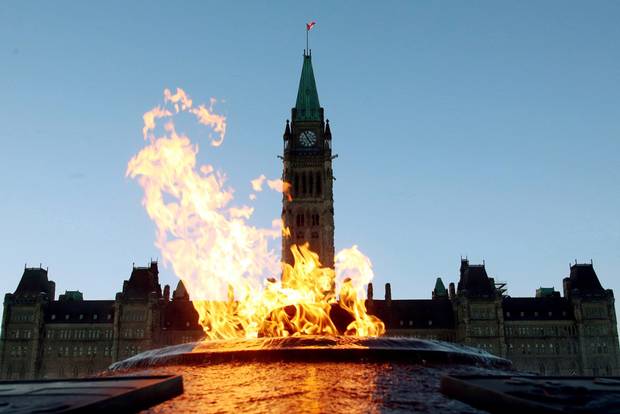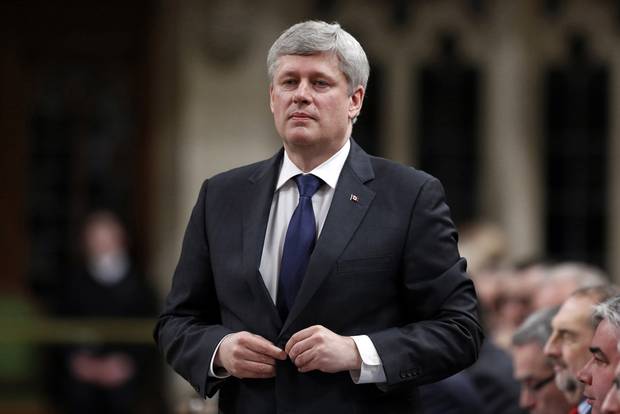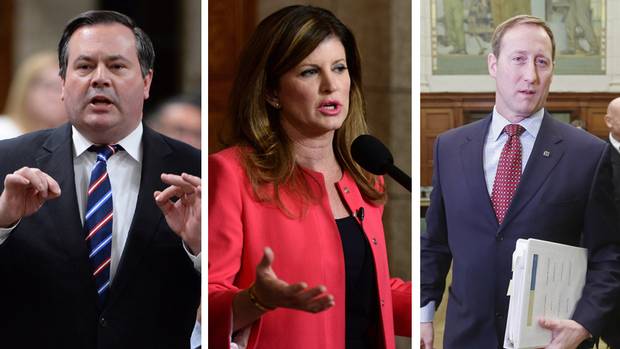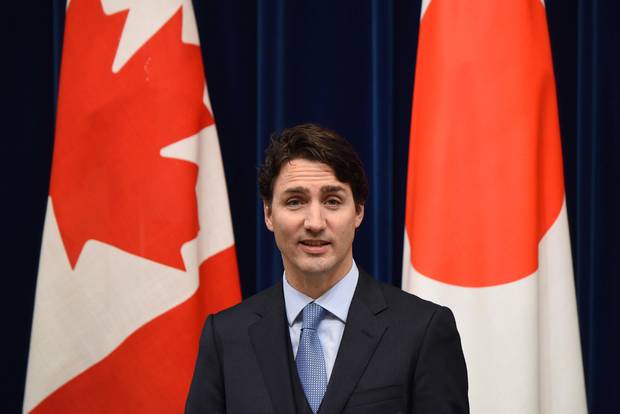
The Centre Block of the Parliament Buildings is shown through the Centennial Flame on Parliament Hill in Ottawa on Sunday, January 25, 2015.
Fred Chartrand/THE CANADIAN PRESS
Delegates meet in Vancouver later this week to chart the future of the Conservative Party after Stephen Harper, who reunited a fractured movement, led it to a decade of power, but also led it to defeat last October at the hands of the resurgent Liberals. For the party and the movement, the question is: What comes next?
The party can be proud of its strength in defeat: 99 seats on election night, with 32 per cent of the vote. Personal, regional and ideological schisms that rent the party in the past – pitting John Diefenbaker against insurgent leader Dalton Camp, Joe Clark against Brian Mulroney, the Reform Party against the Progressive Conservatives, the "Rebel Alliance" of MPs against Canadian Alliance leader Stockwell Day – are mostly quiescent. Conservatives in defeat have never been more at peace with each other. And fundraising – the most reliable measure of a party's morale – remains robust. In the first quarter of this year, the Conservatives raised $5.5-million, more than the Liberals and NDP combined.
Most important, the movement knows what 21st-century conservatism means: fiscal discipline, ever-lower taxes, respecting provincial rights, putting the victim before the criminal in the justice system, putting Canada First in foreign policy.
Yet formidable challenges face the delegates and the party. How do Conservatives confront climate change? How can Conservatives bring healing to relations with indigenous Canadians? Most important, which leadership candidate would do the best job of uniting the party and confronting a youthful, charismatic and popular Justin Trudeau? Before the party faithful can decide who can best lead them to victory in 2019, they must first talk among themselves about what they believe together, what they want to do together, what it means to be a Conservative After Harper.
Stephen Harper's legacy is a unified party

Former prime minister Stephen Harper stands to speak during Question Period in the House of Commons on Parliament Hill in Ottawa March 10, 2015.
Chris Wattie/REUTERS
On Thursday night, delegates will pay tribute to Stephen Harper, the 22nd prime minister and first leader of the Conservative Party of Canada. Mr. Harper, who has kept a low profile since departing the leadership, will also speak to the convention.
While the former prime minister left office unpopular with most Canadians, he remains popular within the party. After all, he healed the schism between its Reform and Red Tory wings, and governed consistently and successfully as a genuine conservative, however much he might have trimmed his ideological sails from time to time.
"They always viewed him as supersmart, superdiligent, fastidious about public policy, good at it," veteran party activist Rick Anderson says. Though some ideologues chafed at his pragmatism, Mr. Anderson believes most Conservatives are grateful for Mr. Harper's leadership and will genuinely honour it Thursday night.
That said, "I don't think there are very many people in the party who are happy with the last election campaign, including the former prime minister," Mr. Anderson says. Some of the points of contention: obsessing over the niqab; barbaric cultural practices; the Ford brothers.
Beyond the campaign, the leader is the literal face of a political party. And Mr. Harper became known for his autocratic and controlling ways, his intense partisanship, his bouts of philistinism – cancelling the mandatory long-form census, challenging the Chief Justice – that eventually led voters to seek an alternative.
Peter MacKay, who partnered with Mr. Harper in merging the Progressive Conservatives and the Canadian Alliance, and who served in cabinet almost for the duration, says the task of the party going forward will be to preserve the strongest elements of the Harper legacy, "keeping our focus on the economy, on the fundamentals," while also addressing the issue "of openness and inclusion … that has to be baked into Conservative policy and principle."
Mr. MacKay is a leading contender to replace Mr. Harper, though he insists he will make no decision until after the convention.
Leadership contenders biding their time

Former cabinet ministers Jason Kenney, left, and Peter MacKay, right, are tight-lipped about any run at the Conservative Party leadership. Current interim leader Rona Ambrose, centre, may get a chance to throw her hat into the ring if supporters succeed in changing party rules at the convention.
The Canadian Press/Reuters
It's been more of a trickle than a stampede out of the starting gate in the race to lead the Conservative Party.
Some blame the weaker donor base. Calgary and its oil wealth have traditionally been a rich source of money for campaigns, but sickly petroleum prices have curbed the enthusiasm of would-be backers.
Then there's the Trudeau factor. Bigger-name candidates are worried they could end up as a sacrificial lamb against a popular and telegenic Liberal rival who could easily win a second term in 2019 – particularly if the Liberals change the voting system to a method that favours their centrist party.
"The leadership hasn't bloomed yet because there's a working assumption amongst everybody that there's no chance in 2019," one senior Conservative organizer says, speaking on background because he is not authorized to talk publicly about this.
There's even a "Draft Rona" campaign to change party rules so that interim Conservative leader Rona Ambrose can run for the permanent leadership – an issue that will be debated at the convention.
Big names such as former justice minister Peter MacKay and former defence minister Jason Kenney are holding back, weighing their options with the leadership vote still 12 months away. The same goes for former transport minister Lisa Raitt and former treasury board president Tony Clement, who sources say is leaning toward running.
It may benefit some would-be contenders to announce before the summer barbecue season – so they can campaign in backyards and kitchens – but that would mean they'd have to make their maximum $5-million leadership budget stretch over that many more months.
Mr. Kenney, a key player in the Harper government, is still giving serious consideration to running for office in Alberta, sources say, even as he faces significant pressure to run for the federal Conservative leadership post.
Mr. MacKay, whether he wants it or not, remains the standard bearer for the Red Tory side of the party. He's got a young family and a recent job with U.S.-based global law firm Baker & McKenzie. If Mr. Kenney doesn't run, there's talk of drafting former Commons speaker Andrew Scheer, fluently bilingual, to run as the Western-based small-c conservative candidate.
Those who've already declared for the leadership campaign include former labour minister Kellie Leitch, former small business minister Maxime Bernier and MP Michael Chong.
Policy debates will be front and centre
One party resolution calls on police to issue tickets rather than charges for “small quantities of marijuana.”
Dave Chan/For The Globe and Mail
For the first time, the Conservatives are opening almost all of the policy debates at their party convention to media and observers.
This means a debate in Vancouver over whether to sand the edges off of the Conservative Party's socially conservative agenda will take place in front of the cameras.
This will include Policy Resolution 422, which aims to remove the party's definition of marriage as "the union of one man and one woman." Interim Conservative leader Rona Ambrose has said she would back such a move.
The resolution also seeks to remove a line that says religious organizations should be free to refuse to perform wedding ceremonies or the use of their facilities, and a reference to how Parliament and not the courts "should determine the definition of marriage."
And while the Conservatives remain opposed to legalizing marijuana – a Justin Trudeau campaign promise – there is a call for the party to embrace decriminalization when it comes to possessing a little bit of pot. One resolution calls on police to issue tickets rather than charges for "small quantities of marijuana" as a means of reducing "the volume of judicial proceedings."
Resolution 497 would remove party opposition to legislation that would legalize euthanasia and replace it with: "We believe that all Canadians have the inalienable and private right, after deep personal reflection, to make their own end-of-life decisions."
Conservative foreign affairs critic Tony Clement, a potential leadership contender, says he believes the party needs to broaden its appeal in non-traditional areas by talking more with voters about problems such as poverty reduction and the environment.
"We can't change the core of who we are – fiscally prudent, low taxes, a strong military – but we have to talk about more issues," Mr. Clement says. "Poverty reduction, environment, indigenous rights – but a Conservative point of view on all of those instead of emulating the Liberals."
Mr. Clement says in the previous government, the Conservatives were stuck in a "straitjacket of only talking economy, generally, and security," and "we couldn't talk about those [other] issues because it was off message."
"We didn't have anything to say to city-dwellers, we didn't have anything to say to millennials – these things racked up huge disadvantages for us."
Laying the groundwork for 2019

Prime Minister Justin Trudeau speaks during a joint press conference in Japan Tuesday, May 24, 2016.
Toru Yamanaka/Pool Photo via AP
Some Conservatives, speaking off the record, are in such despair over Justin Trudeau's sky-high popularity that they wonder whether the party should choose a placeholder to get it through the debacle to come in 2019, and then rebuild for 2023. History contradicts such pessimism.
In the wake of the 2011 election, Canadian progressives argued among themselves over whether the Liberal Party had any hope of rebuilding or should merge with the NDP. Even after Mr. Trudeau won the leadership, many questioned whether he could bring the party back to power. It's hard to remember, but at the start of the 2015 election campaign, conventional wisdom held that Tom Mulcair was the leader most likely to defeat the governing Tories.
Trudeau fatalists should also recall that, as popular as Mr. Trudeau is today, Pierre Trudeau was at least as popular after his Trudeaumania victory in 1968. Four years later, however, the Liberal prime minister came within several seats of losing to the Progressive Conservatives' Robert Stanfield, one of the least charismatic party leaders in Canadian history.
The Tories are hoping the 2,100 delegates attending the Vancouver convention emerge from the get-together more energized about their chances in 2019.
Any Conservative who feared that the Liberal honeymoon might last for years would certainly have had reason to rethink that last week after Mr. Trudeau's bizarre decision to get physical in the House of Commons – and the spate of apologies that followed.
One Conservative organizer, who spoke on condition he not be identified, says the biggest factor in the 2019 election, however, may be whom the New Democrats choose to replace Mr. Mulcair as leader. Will this person be charismatic and compelling – or will the NDP choose its own placeholder?
Conservative fortunes tend to rise when the NDP is successful at eating into the Liberal Party's left flank – as they did in the 2011 election.
"Whether the NDP is a 12-point party or a 25-point party in the polls will make the difference in who wins the next election," the Tory official says.